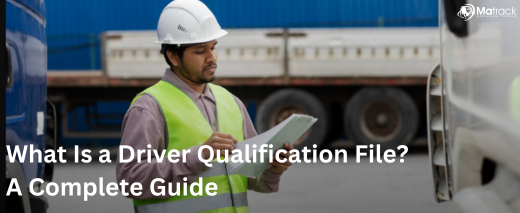Key Takeaways:
- A Driver Qualification File (DQF) is a required record that ensures commercial drivers meet FMCSA safety and medical standards.
- Employers must maintain DQFs with essential documents like MVRs, medical certificates, and employment history to comply with federal regulations.
- Regularly updating and reviewing DQFs helps companies avoid fines, legal trouble, and safety violations during audits.
- Failure to maintain a DQF can result in severe penalties, license suspensions, and increased accident liability.
What Is a Driver Qualification File (DQF)?
Driver Qualification File (DQF) is a mandatory record that employers must maintain for each commercial driver. It ensures drivers meet FMCSA safety and medical standards before operating large vehicles.
A DQF includes documents verifying a driver’s history, medical fitness, and regulatory compliance. Employers use it to track qualifications, prevent violations, and stay compliant with federal laws.
Why Is a Driver Qualification File Important?
Driver Qualification File (DQF) is important because it helps trucking companies follow the law and keep their drivers safe. Here’s why every company needs one:
- Follows FMCSA Rules – The government requires companies to keep DQFs for all commercial drivers.
- Protects the Company – Having complete records can prevent legal trouble and costly lawsuits.
- Keeps Roads Safe – Ensures that only healthy and qualified drivers are behind the wheel.
- Avoids Expensive Fines – Missing or incomplete DQFs can lead to big fines during inspections.
- Prepares for DOT Audits – The Department of Transportation (DOT) checks DQFs to make sure companies are following the rules.
Who Needs a Driver Qualification File?
Any company that hires commercial drivers must keep a Driver Qualification File (DQF). This includes drivers who operate large trucks, buses, or other commercial vehicles.
Drivers who cross state lines (interstate drivers) need a DQF if their vehicle weighs 10,001 lbs or more, carries hazardous materials, or transports 9 or more passengers for pay. Some intrastate drivers (those driving within one state) also need a DQF if their state follows FMCSA rules.
Owner-operators who drive their own commercial vehicles must also keep their own DQF. Even if they work for themselves, they still need to follow the same federal regulations.
Also see: What Is FMCSR
What Documents Are Required in a Driver Qualification File?
A DQF must include specific documents to comply with FMCSA regulations. Below is a breakdown of required records:
Driver’s Employment Application
The driver must complete an employment application containing:
- Full name, address, and date of birth.
- Driving history for the past three years.
- Information on prior employment (past three years for non-CDL drivers, past ten years for CDL drivers).
- Disclosure of violations and accidents.
Motor Vehicle Record (MVR) – Initial and Annual
The employer must obtain:
- Initial MVR from each state where the driver held a license in the past three years.
- Annual MVR updates to review the driver’s safety record.
Road Test Certificate or Equivalent
A driver must pass a road test before employment unless:
- They provide a CDL (Commercial Driver’s License), which can serve as an equivalent.
Medical Examiner’s Certificate (Medical Card)
A valid DOT medical exam is required to verify a driver’s physical fitness to operate a CMV.
- CDL holders must be examined by an FMCSA-certified medical examiner.
- The certificate must be renewed every two years unless medical conditions require more frequent evaluations.
Medical Examination Report (Long Form)
The complete medical examination report, signed by a qualified medical examiner, must be kept on file.
Certification of Compliance with Alcohol and Drug Testing
Drivers must sign a statement acknowledging their compliance with DOT drug and alcohol testing requirements.
Previous Employer Safety Performance History
Employers must contact previous employers (last three years) for:
- Drug and alcohol test history.
- Safety records.
- Accident reports.
Annual Driver’s Certification of Violations
Drivers must submit an annual certification listing any traffic violations received in the past 12 months.
Annual Review of Driving Record
Employers must annually evaluate the driver’s MVR and sign off on their continued qualification.
Entry-Level Driver Training (ELDT) Certification (If Applicable)
New CDL drivers must provide proof of completing FMCSA’s ELDT requirements.
Copy of the Driver’s CDL
A copy of the driver’s valid commercial driver’s license must be included.
Hours-of-Service (HOS) Training Certification
Drivers must receive training on FMCSA’s Hours-of-Service regulations.
How to Maintain Compliance with Driver Qualification Files
Keep Files Up to Date
DQFs must be regularly updated to reflect changes in the driver’s qualifications, medical status, and driving record.
Conduct Annual Reviews
Employers must:
- Obtain an updated MVR annually.
- Have drivers certify their violations each year.
- Review and document the driver’s overall safety performance.
Store Records Correctly
- Keep DQFs for each active driver.
- Retain DQFs for at least three years after employment ends.
Conduct Internal Audits
Perform regular audits to ensure all required documents are present and up to date.
Use Compliance Software
Employers can use DQF management software to track expiration dates, missing documents, and compliance status.
Common Violations and How to Avoid Them
| Violation | How to Avoid It |
| Missing driver qualification file | Maintain a DQF for each driver. |
| Expired medical certificate | Track expiration dates and schedule renewals. |
| Incomplete employment verification | Contact previous employers and document responses. |
| Failure to review MVR annually | Obtain and review MVRs every 12 months. |
| Missing annual violation certification | Require drivers to submit annual violation statements. |
What Happens If You Don’t Maintain a Driver Qualification File?
Failing to maintain a DQF can result in serious consequences:
- FMCSA Penalties: Fines of up to $1,500 per day, per violation.
- DOT Audits & Investigations: Companies without proper records may face suspensions or loss of operating authority. Know more about: DOT Audits.
- Increased Insurance Costs: Missing DQFs can lead to higher insurance premiums due to safety risks.
- Lawsuits & Liability Issues: If a driver is involved in an accident, missing qualification records can lead to legal consequences.
Conclusion
Keeping a Driver Qualification File (DQF) is important for following FMCSA rules and keeping drivers safe. It helps companies avoid fines, legal trouble, and safety risks.
Regularly updating DQFs ensures drivers meet legal and medical requirements. This keeps the company running smoothly and protects it from penalties or accidents.



